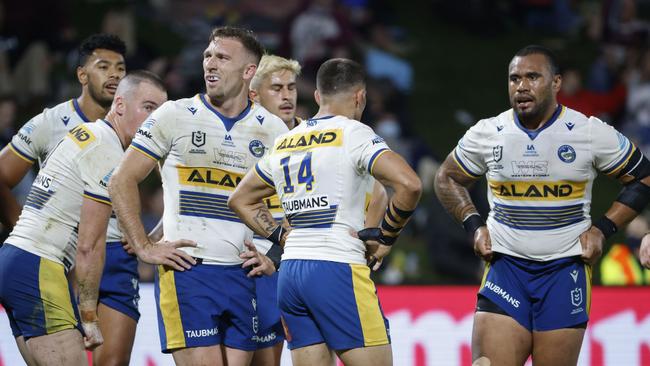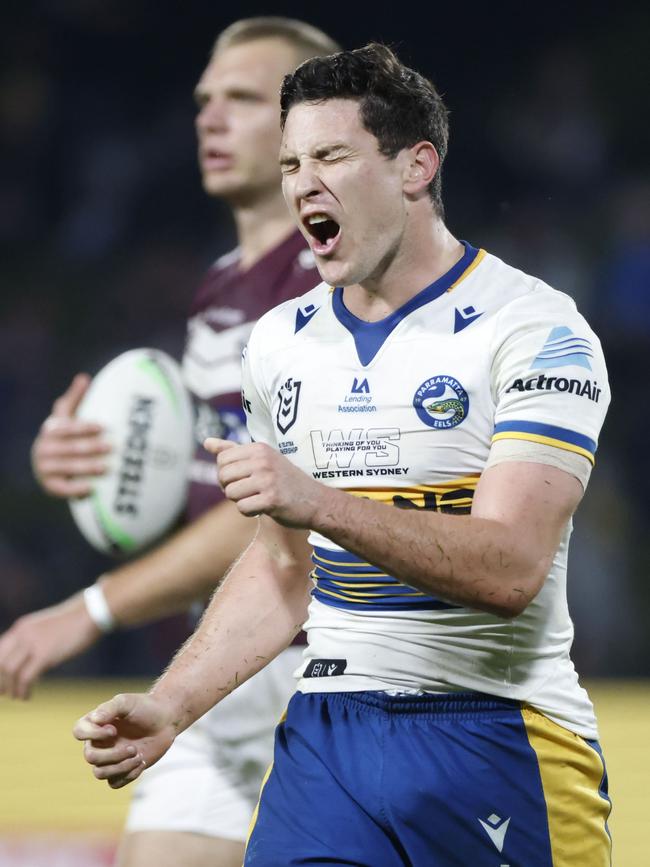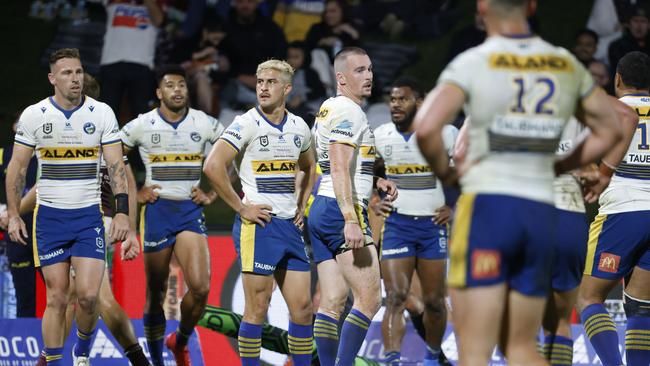Paul Kent: The moment Parramatta’s season nosedived
Balconies, ocean views, room allocations ... hotel vibes have a way of infecting a playing group. Parramatta’s fall from grace can be pretty well pinpointed to the day, writes Paul Kent.

Eels
Don't miss out on the headlines from Eels. Followed categories will be added to My News.
No problem is too small in a losing dressing room.
Where it began for Parramatta is as hard to pin down as trying to see where it might end.
The reasons being offered for Parramatta’s end of season stumble, which is becoming an annual event, range from ridiculous to legitimate.
The best of all came out over the weekend, a small whisper that there is in-fighting at the Eels since soon after they arrived in their Queensland bubble.
If it was true it would not make them entirely unusual in anything except the reason why.
Parramatta flew into Queensland off a bye, the game the previous week being a narrow 13-12 loss to Penrith.
The race to the 2021 NRL Telstra Finals Series is on and every game matters. Watch Live & Ad-Break Free on Kayo. New to Kayo? Try 14-days free >
Certainly all signs were good at the time.
Around this was clearly a holiday atmosphere, one witnessed at several clubs. Players were seen heading towards the hardship of the NRL bubble struggling to carry their golf clubs onto their planes.
There is little doubt some of the wives and girlfriends who would follow them had similar hopes.
Soon, the reality of quarantine set in.

Some rooms were without balconies. Some rooms were bigger than others.
The wives and girlfriends arrived soon after and had to endure their own 14-day quarantines, which received no recommendations.
But here it gets a little bizarre.
What is believed to have begun the problems at Parramatta was the room allocations, which were decided by status within the team rather than personal requirements; in other words, the better players got the better rooms.
The family men lower down the status rankings had no choice but to take what was left.
Try explaining to a wife with three kids at her ankles that the reason they don’t have a balcony with ocean views is because they keep failing to push up on the inside.

It seems trivial to anyone who has not had to endure the super whammy of a 14-day quarantine and sucking in airconditioned air while watching the kids bounce off the walls, all while eating hotel food three times a day under strict conditions.
It correlates with the Eels’ performances. Since arriving in Queensland Parramatta’s form has nosedived.
The Eels beat Gold Coast convincingly in their first game two days after arrival but have not won since.
An upset loss to Canberra the following week was followed by convincing losses to the Sydney Roosters (28-0) and, after the wives and girlfriends arrived, South Sydney (40-12) and last weekend Manly (56-10).
And while it sounds absurd that part of Parramatta’s problems could be blamed on something so far removed from the playing field, if Manly can attribute their late season rush of form to life in the bubble and the shared experience of torturing coach Des Hasler in camp, something they have delighted in, then the opposite must also hold true.
Hotel vibes have a way of infecting the playing group.
Phil Gould accused the Eels of giving up against Manly. They certainly seemed unmotivated and isolated.

Those were also classic signs of a team unhappy off the field and so their on-field efforts were focused on self-preservation.
It would explain simple actions like that over the weekend when Nathan Brown dropped the ball.
Within the happy teams a dropped ball is most often treated like a small celebration, strangely enough, with teammates rushing in to rub their teammate on the head or slap him on the back to show it doesn’t matter.
When Brown dropped the ball his teammates simply looked at him. It was as cold a moment in the season of the Parramatta Eels as ever was.
The problem for the Eels is that even talk of problems within can become self-fulfilling.
Parramatta is desperate for strong leadership at the moment.
Misery becomes self-fulfilling.
What clubs need more than anything else at times like this is strength in leadership.
The weekend decision from management to send a statement to Parramatta members, assuring them all is OK at the Eels, was a nervous decision and reveals the inexperience at the club.
Leadership is about control, and knows that silence is always a better option than a weak message.
The Parramatta players need to feel coach Brad Arthur is in control and Arthur needs to feel that the club bosses have it all in hand.
And the club needs to forget about patronising fans.
Silence can also be a strength.
Whenever correspondence like this comes from clubs the news is usually received with as much hope as the message from the building jumper as he passes by the 12th storey window telling us, “All good so far!”




